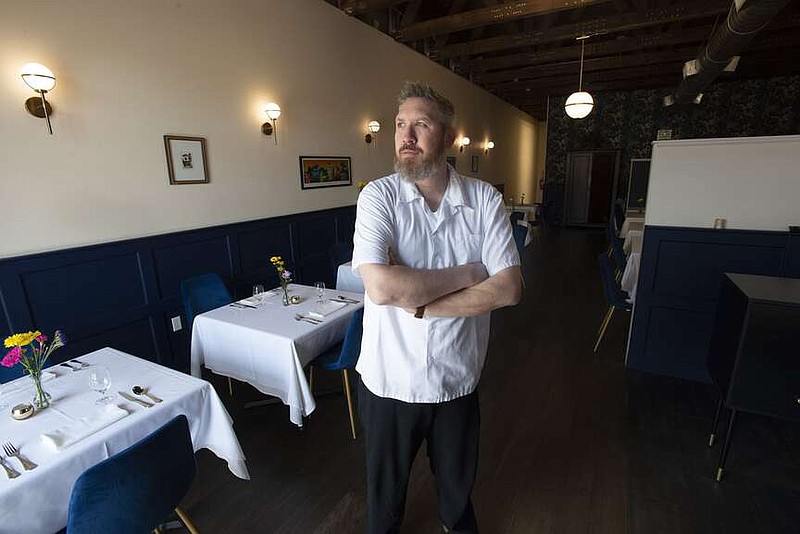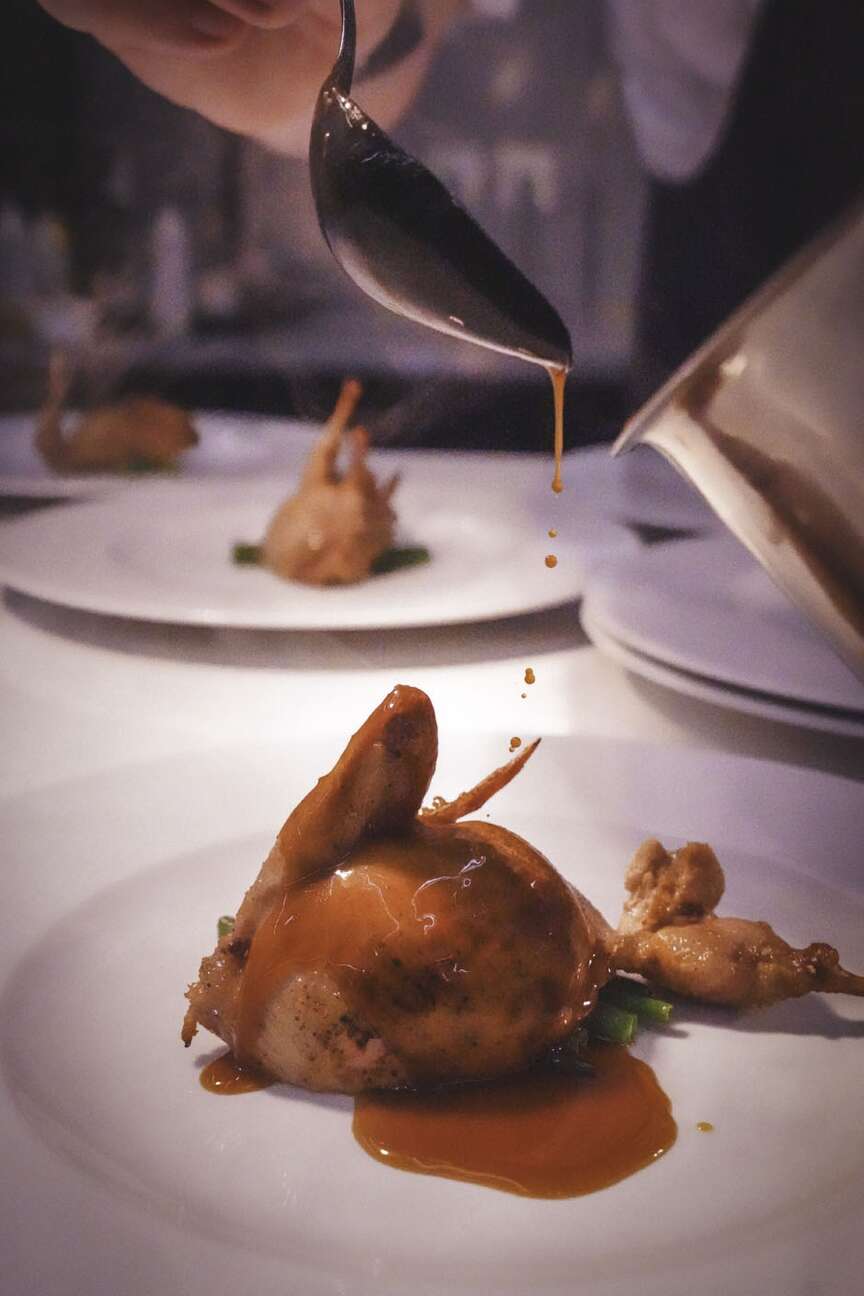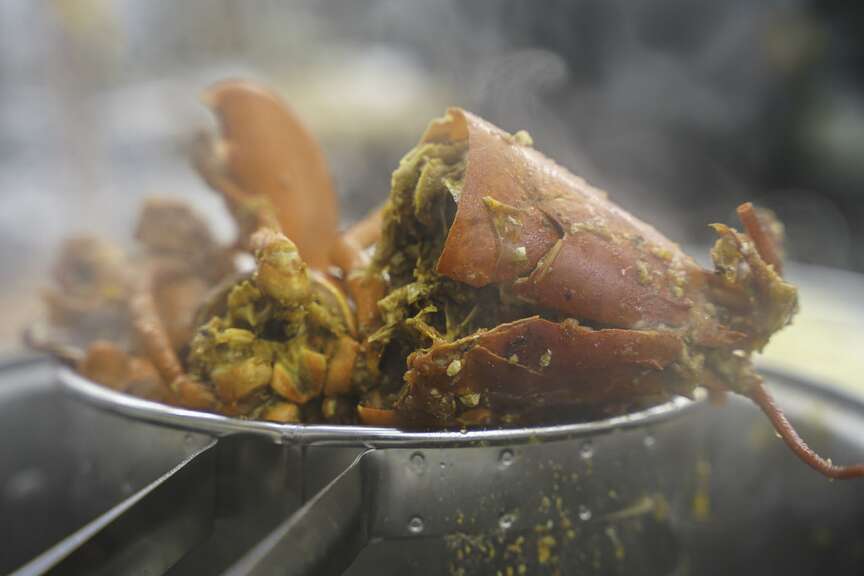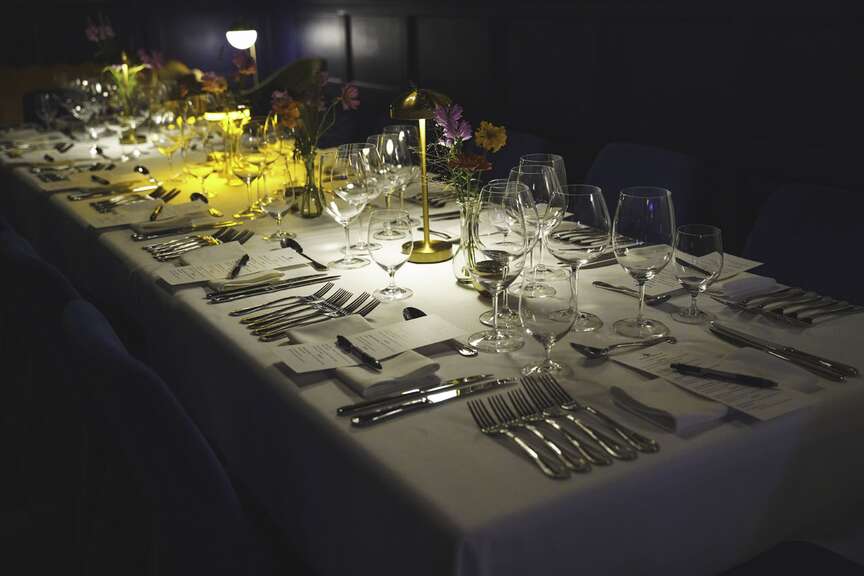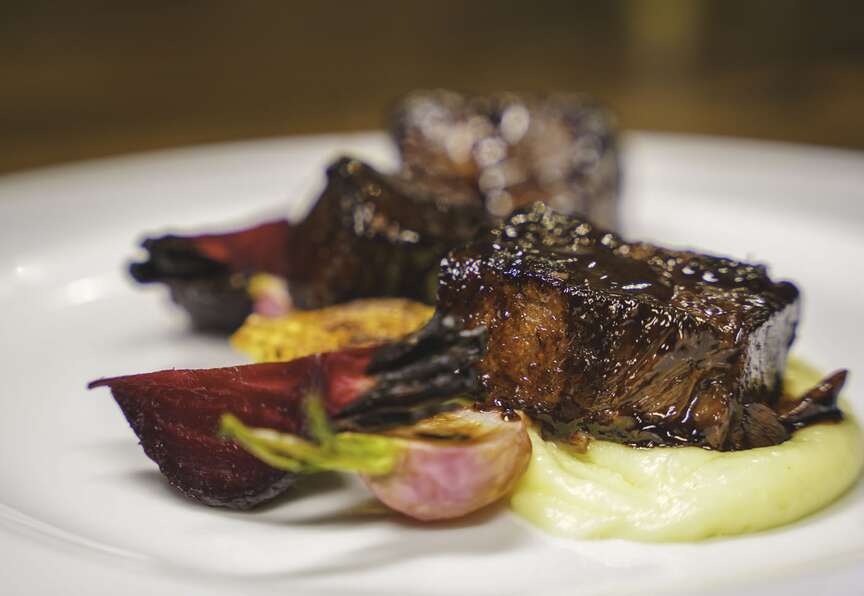What Chef William Mauk wants you to know about French food is that it's not complicated -- neither the dishes, nor the ingredients.
"The philosophy of our kitchen is that every ingredient has the same culinary value," said Mauk, who is chef and owner of restaurant Bienvenue, the only French fine dining restaurant in Northwest Arkansas. It opened in late summer 2023 in downtown Springdale right along the Razorback Greenway. Of course, the ingredients have varying financial values, "but we make sure to take the same time and effort and attention into all the things that we do."
On March 21 Bienvenue will be the venue for the Spring Art Gala benefit, where a $20 donation will include wine and hors d'oeuvres. Proceeds go to Spring Creek Food Hub, which connects farmers and the community by putting local food on the table. "By providing education, technical assistance and supply chain access, we ensure healthy food access for all Northwest Arkansans," according to its website.
Mauk promises the night will not only offer a way to contribute to something important, it will also be a lot of fun.
"Bienvenue, even though it's elevated dining, it still fits into the aesthetic of downtown," said Jill Dabbs, executive director of Downtown Springdale. "It's humble and welcoming and feels like home."
PERUSING THE MENU
Unlike so many fine dining establishments, one look at the menu of Bienvenue will tell you plainly what to expect without a lot of flowery language.
Mauk said this is a purposeful touch. Making descriptions as simple as possible ushers guests along to the actual experience of "here, try this."
In making a restaurant that is many locals' introduction to French food and wine, Mauk finds himself giving more guidance for the wine list than anything else.
"We've taken them instead of region -- which is how the French purchase wine, by region -- we've separated them by varietal," Mauk said. That makes it easy to choose based on preference and taste. To further cut down on any potential confusion, the menu also uses very few French words. It sports only the ones that don't have a proper English translation.
The food itself is familiar enough to the average American, merely prepared in ways more traditional to French home cooking style. Among the dishes on this season's menu is short rib bourguignon.
"Americans like short rib, that's not a stretch," Mauk said. And bourguignon is stewed beef in red wine, a technique that cuts through the toughness of the meat used. The pommes puree is frankly an elevated form of mashed potatoes. To prepare them, "we roast them, we don't boil (them) because that adds water and dilutes the flavor."
The pommes puree is baked, pushed out of the flesh of the potato and milled through a fine sleeve. Then a lot of butter, cream and some salt are added.
Fruit de mer is a seafood pasta consisting of braised octopus, blue crab, sea scallops and Arkansas-raised shrimp -- grown on an aqua farm 30 miles south of Springdale. It's all seasoned with chili, garlic and lemongrass sauce.
"To make this dish, we cleaned and cooked octopus with aromatic vegetables in white wine, cooked it for a long time and chilled it in the liquid that it's poached in," Mauk said. The mussels are without shells in Fumé Blanc, a white wine stock, with tomatoes and chili. Crab meat and sea scallops get seared toward the end. The pasta Sardinia gets olive oil and saffron for a golden tint. The resulting stock gets used for the mussels, cooked with shallots and garlic, then strained and finally combined with a tapioca thickening agent.
For Mauk, the food side is the familiar part. It's being at the helm of a restaurant and handling all the many aspects of scouting locations, building a business from the ground up, learning marketing skills and the like, that's brand new.
ENTRY TO A WORLD OF FOOD
William Mauk's culinary journey began when he went to work at a French restaurant in Baton Rouge. It was classic French dining -- a small place where the servers wore white gloves and the plates were laden with heavy sauces that you might expect. As he began to outgrow the place, Mauk's friends were going off to culinary schools, so he did too. He traveled 80 miles east to what was then known as the Culinary Institute of New Orleans.
At that time, Food Network and "Hell's Kitchen" had not yet catapulted the popularity of chef as a profession.
"When I was young, working in a restaurant wasn't what your parents told you to do," Mauk said. "Career days at school, they had the Army set up and universities, but nothing with a culinary school."
And while those sensational shows are not something that he or his friends in the profession watch or enjoy, Mauk acknowledges that without them, there might not be as much money in the gig as there is now.
New Orleans quickly became William Mauk's favorite city in the world. The place that was his home for 15 years gave him a lot of kitchen experience in cool restaurants. While the Culinary Institute gave him a knowledge base for his profession, it was the Windsor Court Hotel that gave Mauk the majority of his culinary training. At the time it was a five-star, five diamond hotel, and its kitchen was one of the best in the U.S.
"The stuff we were doing in Windsor wasn't going to be in the culinary school or in the books for maybe a decade (from then). It was very advanced," Mauk said. In a word, it was all about precision. "Everything was very intricate and (there were) several components on the dishes. It took so many people to pull that off."
Unlike an American kitchen, in which everyone has a job to do but it's based off the style of cooking -- saute cook, grill cook, fry cook -- the French kitchen is based off of the food you handle and what you create with it. One chef handles all fish, another might handle all meats, while one creates small plates or another works with vegetables.
"The thought process is you can grill fish and fry fish and saute (it), and it's probably closer to the way you want your finished product than handing it to a meat guy and having him flip them over with tongs ... (with less) finesse," Mauk said. To maintain their rating status at the Windsor Court, they had to perform dining service 24 hours a day. Some stayed overnight for suite service, but there were breakfast cooks, lunch cooks, dinner cooks, a few for banquets and more for the employee cafeteria. "It just took a massive undertaking to pull that stuff off."
The size of the kitchen, the equipment and ingredients were learning curves for Mauk at Windsor Court. In a French bistro kitchen, there's no excess of equipment, he said. You have whatever you need to do the job and nothing more. A chef will make sauces, soups and stocks all in the same pot.
At Windsor Court, there was a front kitchen, a back kitchen and a pastry kitchen. It had a $20,000 truffle budget at the time, there were six or seven different types of caviar available, and one cooler had nothing but an assortment of cheeses. The first time Mauk's sous chef told him to go down to the cooler and get lemongrass, he was sweating bullets because he had no idea what that was. It was overwhelming as he realized the extent of what he needed to learn.
Mauk worked with the banquet chefs for a while and strove to be on the PM line, where chefs could gain more accolades. Eventually he became the poissonier, the chef who handles all fish.
When the Hell's Kitchen-style atmosphere of Windsor Court began to wear on Mauk, he landed an opportunity with French master chef René Bajeux through a couple of friends who were working for him.
CUISINE OF THE EARTH
Around this time, while living in the U.S., Chef René Bajeux had left the elite dining scene to create a restaurant with the style of cooking he grew up with in Lorraine, France. Haute, which translates as the cuisine of the earth, was all about flavor and the wholesomeness of the ingredients, Mauk said. It also placed a strong emphasis on preventing food waste, unlike the selectiveness of Windsor Court that would discard anything that was not perfect quality, roughly 20% of the food they received.
The two styles and settings were so different that Mauk had to be retrained. Now he was supposed to use all the food, and the speed at which he had to plate up turned on a dime. Their bistro would serve 300-350 orders with no tickets.
"That was hard," Mauk said. "He's yelling what he needs, and we're calling it back and doing it by memory." It wasn't unlike the Waffle House in that way, he notes. But rather than being scattered and smothered, it was escargot, sardines and octopus.
Mauk spent about a year under Bajeux's direction and then went on to other restaurants. After Hurricane Katrina, the chefs scattered out to other places during the two-year period that they couldn't live in New Orleans. Mauk went to Springfield, Mo., where he met his wife Annie and worked at Clary's Restaurant, which is no longer open.
The dream of creating and owning a restaurant existed for Mauk even then, and Annie was supportive of it from the very start. She's the one who always thought it would wind up being called "Bienvenue," which means welcome.
"At first I wasn't necessarily going to go all-in about it being French," Mauk said. "But it became harder to describe what I wanted to do in the culinary scene. It was just easier to (designate it) French and lean into that."
When the couple moved to Northwest Arkansas, restaurants of the region had a very particular folksy, hipster style, and so many of them shared the same aesthetic. Mauk wanted his eventual restaurant to stand out, starting with a different overall feel. He wanted high quality food of course, but he also wanted pressed linen tablecloths, crystal water glasses, nice wine glasses and more.
It took time to come to fruition because at first they didn't have much money to devote to the project.
"I didn't want to open a restaurant until I had the one I wanted," Mauk said. "That's why it took me so long ... we just kept making it smaller until we could afford that."
The first time he tried to open Bienvenue, Mauk had chosen a location in Rogers. The place was sectioned off for a restaurant, but didn't have the appropriate infrastructure, then he couldn't get any traction with the builders. After that experience, he felt like he could put a restaurant just about anywhere, and it would work out.
"If it's done right, and the food's good, people will come in," Mauk said. Once they found their location in Springdale, he and his kitchen crew helped with sheetrock and any labor they could to keep the project moving along. Then Mauk and his wife added the finishing touches with art from their home.
"They did whatever it takes," Dabbs said. "It's very hospitable; it feels very warm and welcoming every time I walk in the door."
With a hefty schedule of spring and summer events planned for Turnbow Park, Dabbs said she can't wait to see people dining on Bienvenue's patio and enjoying the outdoor music events on its doorstep.
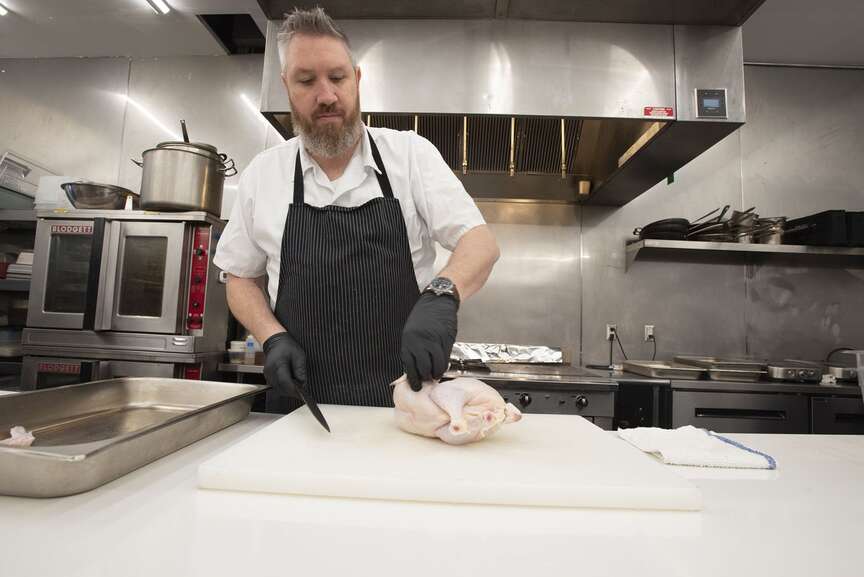 Bienvenue has seasonal menus with food inspired by French home style cooking, something Chef William Mauk learned from a variety of experience in French bistros in New Orleans and working for French master chef René Bajeux. Much of his culinary team followed him from Ella's Restaurant in Fayetteville. NWA Democrat-Gazette/J.T. Wampler
Bienvenue has seasonal menus with food inspired by French home style cooking, something Chef William Mauk learned from a variety of experience in French bistros in New Orleans and working for French master chef René Bajeux. Much of his culinary team followed him from Ella's Restaurant in Fayetteville. NWA Democrat-Gazette/J.T. Wampler